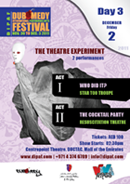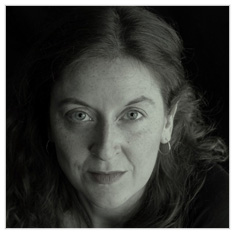Interview with Sol Abiad
Director of Star Too Theater Troupe
You have studied theater for many years, could you tell us about your performance and training background?
My 20 year experience spans from acting to directing to costumes and props making, in plays and festivals in Canada, France, U.K. and now U.A.E. Convinced that theatre is multi-disciplinary par excellence, my background includes, music, writing, dance, and visual-arts. I love to promote the ensemble concept and collective work. I started theatre when I was at school in Paris and had the terrific opportunity to learn with the now widespread International Schools Theatre Association programme. It forged my belief in the importance of educational theatre and its benefits for human development as well as its immeasurable impact on society. I ran a small theatre company called La Bouche in Canada with a local writer and a sculptor. The mix was wild. While acting was still something I pursued by going to acting school in France, mixing things up is something that I knew I wanted to keep doing. I did an M.A. in Performance at Bristol University and focused on the role of women in theatre. I ended up working in personality development through drama and found that very rewarding. People in the trade who have influenced me greatly (some I got to train with, others I'm still waiting, some I'll never get to…) include, Peter Brook, Max-Stafford Clarke, Viola Spolin, Deborah Warner, Djanet Sears, Peggy Shaw and Lois Weaver. The experience that inspired me most tremendously was attending Ariane Mnouchkine's workshop at Theatre du Soleil.
How, would you say, Experimental Theater differs from more traditional Theater?
My humble opinion is that experimental means something different depending on place and time. For instance, there are some things in the West that get defined as far out now when they have been run-of-the-mill in other places. I'd say the aim is to approach the art-form from another point of view customarily adopted in the context where you find yourself; twist and push the boundaries that seem to hold it in place for it to go further. Experimental theatre can break down barriers that are there maybe by convention, maybe by laziness or fear to do the unknown. I'd say experimental theatre inspires you to question, think for yourself- not just what you are told, and to understand more deeply what it is you want to understand or achieve, not just be subject to status quo (especially if that status quo is not helping positive progress). If the tradition in your context is a proscenium arch with a fourth wall, tear down that imaginary wall and see what happens. Like anything worthwhile, it means taking "intelligent" risks; demanding more than following a pre-fab template, exercising the flexibility of your body and mind.
Each Star Too production begins with a question as it's theme. How do you choose these questions? Could you tell us a few that didn't make the cut?
Sometimes, questions come from simply talking to people; seemingly haphazard conversations that spark an idea. Sometimes, it's from sitting in a café, catching a march going by and wondering…
Then, one question keeps coming back. When the title sounds simple, honest, wide yet specific, that question sticks. Then, a space-shape in which that question could be answered starts stirring the imagination: Can it be answered on a run-way? In a circle? Through the mirror? Hanging from the ceiling? When just about 100 likely stories that can answer that question keep getting imagined in a space, that space and question win the bid. And then the real work begins. "Why Did The Chicken Cross The Road?" has not been a favourite, but who knows, maybe one day…on a highway…
Could you tell us a little bit about your creative process?
The actors go through eclectic learning that all links together in the end. We've had an architect come in, a magician, a silk dancer, a writer and even a body-builder. They teach us about their trade, share their experience, and give us food for thought. We train our bodies, our voices, our gestures. At times, we meditate. We improvise and let stories take shape naturally. The actors compose their own narratives but include everyone else in the group to animate their tale. They have an added challenge: no props, no costumes. In semi-dance gear, we use large pieces of cloth and foam sticks. If an actor says she's imagining a boat, everyone comes together to be that boat for her. If an actor says he walking on the moon, everyone stretches out a giant cloth for him to traverse through as they're waving it. We have everything we need to create anything and any place: ourselves. We also rely on the technological wizardry of Drazen Lucic who translates our ideas into audio-visuals when we need multi-media support. And then, there's the question of stitching all those stories together to make one show, where everyone is a star in their own right, sharing the spot with others.
How and when did Star Too come about?
In 2009, I heard of auditions for a workshop on improvisation at the magical Theatre du Soleil in woods outside Paris. I had just finished some work in journalism that I thought would be more useful and had neglected theatre for too long. So I went to the woods. It was very cold. I paid attention and did learn a lot. No one can do it like they do, but then no one can do anything just like anyone. I learned that our teachers teach us steps not simply to repeat them, but to make our own dance. Back in Dubai, it was clear to me that I cannot do without doing theatre, no matter how impractical. Before joining the troupe, Tareq Ghosheh took on the role to have the plan materialize. Supported by such members who are in the troupe right now and inspired by people who are doing performance art in the local community right here (including our DIPAF hosts), and greatly aided by the amazing space at The Fridge Dubai, STAR TOO started as classes in a very cool warehouse, went on to unique productions, and now building on that movement. And if it weren't for the amazing dedication, discipline, intelligence, resilience, and talent of the actors in the troupe, STAR TOO would not have seen the light. These actors are in effect performers, writers, philosophers, instructors, directors, and producers.
You are presenting an original piece entitled "Who Did it?" at this year's DIPAF. What can the audience expect from this show?
To enjoy being surprised, not to bet on the expected, to let your mind freely enjoy the ride, that it's ok not to "understand" everything you can't control, to not wear yourselves out trying to control, to wonder, to question, to wonder about the question. The actors provide their answers; who or what has had an impact on their lives. They learned how to use aerialist silk a bit and built stories taking place in a cabaret.
So, tell us, who did it?
It could be that we all did it by none of us doing it. And those about to re-do that are: Defne Gursoy, Sarah Dufayard, Flora Diaz-Hurtado, Tareq Ghosheh, Assem Kroma and Mario Mira.
 The Theatre Experiment
The Theatre Experiment
ACT I Who Did It?
by Star Too
Date: Friday, December 2, 2011
Venue: Centrepoint Theatre, DUCTAC, MOE
Doors Open: 02:00 pm
Show Starts: 02:30 pm
Tickets: AED 100
Book Now!



